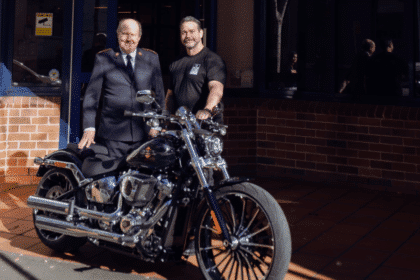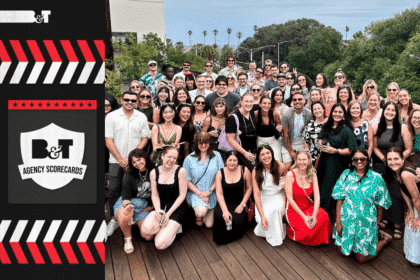Did you miss B&T’s latest print edition? Make sure you don’t miss the next one by subscribing here. The below article appeared in our March issue and is an example of some of the cracking content you’ll find in the B&T magazine.
Agency creative teams might be notoriously stacked with blokes, so why are so many men increasingly disengaged with the ads they’re served up?
It’s one of the great ironies of adland. Its creative departments are awash with men, mostly ruled over by male ECDs, so why is it then, with all this machismo and testosterone, do agencies often turn out work that most males are unsympathetic to at best and utterly indifferent to at worst?
The problem was best highlighted by last year’s (polarising) Gilette #Metoo ad that tackled issues surrounding toxic masculinity. The ad garnered almost universal industry praise but was panned and derided by the people that count the most – the millions of men that buy Gillette razor blades.
When the ad was posted on YouTube it got double the dislikes as it did likes. There were even calls for a global boycott of the brand and, to ice the disaster, Gillette’s personal care division suffered a $US8 billion loss in sales all attributed to the fallout from the ad.
Virtue-signalling PC guff
UK media rabble rouser Piers Morgan led the backlash at the time: “I’ve used Gillette razors my entire adult life, but this absurd virtue-signalling PC guff may drive me away to a company less eager to fuel the current pathetic global assault on masculinity,” he tweeted.
Others blasted the company for “crapping all over” the men who’ve supported the company for a century and “gender shaming” men. “Stop trying to emasculate men!” another tweeted.
“Does Gillette want men to start shaving their legs, too?” asked another.
And now new research by brand and marketing agency McCann appears to vindicate the idea that men are not only tuning out to ads, but Aussie blokes are having a whole other crisis in themselves.
Although not male specific, the study, called Truth Central, was based on the answers of 30,000 people worldwide and determined six cultural tensions.
When it came to Aussie males, the study found almost half (47 per cent) agreed suppressing emotions was a good thing. Exactly 50 per cent of Aussie men were uncomfortable about genders becoming more fluid. Seventy-eight per cent of respondents said they’d rather be funny than good looking.
A further 57 per cent of Aussie men agreed “they were confused by what it means to be a man today”, while Australian respondents to the study were tops, globally, for distrust of the media and advertising industries.
Men are tuning out to the message
The problem, it would appear – well, certainly in the case of Gillette – is that agency land may want to deliver purposeful, progressive ads with a social message, while men, on the other hand, are far less interested in hearing it.
Fran Clayton is chief strategy officer at McCann Australia and co-authored the local findings of the Truth Central study.
Clayton believes a lot of the disconnect when it comes to advertising in Australia is that a lot of agencies have cut back on their planning and research “due to financial pressures” and that’s meant “there’s a lot less research into what consumers really want,” she says.
“Agencies aren’t getting any fresh insights and then it just becomes someone’s own opinion and that just gets filtered out through the media bubble,” Clayton tells B&T.
“People from other countries see Australia as courageous, bold, a can-do nation, lots of confidence, successful. But when we looked at the data, it showed Australians are quite conservative, there’s a lot of risk aversion.
“I think Australia’s adland also suffers from this conservatism. We’re all a product of the culture that we exist in. Yes, I think the results (of the survey) would shock adland as it surveys the whole of Australia and not just Sydney’s eastern suburbs.
“We live in a time when we fear offending other people. But at the same time we’re using humour to get around that and that’s a real skill to use that, to dissipate those tensions.
“You can’t go wrong with humour, particularly when advertising to men. I think Aussies want humour, in some form, from every ad and brand in their life. A sense of humour is so valuable in terms of human connection. The way you connect to your friends, family, work mates, invariably it’s by humour,” Clayton says.
men no longer feel represented by brands
Omnicom in the UK was so concerned by its advertising efforts towards men, in March 2018 it started a bespoke agency called “New Macho” whose sole purpose was marketing to men after its own research found that 69 per cent of British males agreed that they didn’t feel represented by brands and were disengaged by advertising.
At launch, its CEO Fernando Desouches said: “Creating New Macho is about both a social responsibility and commercial opportunity. Through extensive experience in marketing to men, we have identified that there are typically differences in how they react and engage with communications and yet the approach tends to be homogenous. There’s a huge opportunity for brands to maintain their relevance by not just shifting their narrative but also execution of their positioning.”
There’s also some science behind all this, too. According to the boffins – and this shouldn’t come as a shock to anyone – men make utilitarian decisions about purchasing and spending over women’s hedonic decisions. Put simply, blokes buy for function (does it work, do I need this, is it useful?) while women’s purchasing decisions are more to do with pleasure. Men are functional, women are emotive.
Men fear being interpreted as feminine
And, it’s when advertising starts playing the emotive card, men quickly tune out. A recent study by Harvard Business School found that most men fear being interpreted as feminine, more so than women fear being interpreted as masculine.
Studies into the sale of grooming products found that when it came to body washes, men just wanted to know it washed the dirt off and cleaned their pores. Women, on the other hand, preferred a wholly more aspirational description – it moisturised, gave them supple skin, it nourished, all with top notes of gooseberry and cinnamon.
For men, a razor must be rust-proof; an aftershave must be cooling and eliminate razor burn. For men, the product needs to “fix” their ills not necessarily convey a story or a message.
Another finding of grooming products is that men don’t take to fancy packaging hence why colours such as black, white and grey often dominate. Men also love a number or fact – 24-hour protection, 75 per cent less dandruff, 100 per cent closer shave.
Bigger and more is always better. That’s why razors have nine blades these days.
The study noted: “This research does not indicate that men are unemotional; just the fact that men and women emote differently, and women look for more aspirational gratification while men exhibit their emotions in overcoming a negative in their life. Which is why it is so important to understand what matters to your target group, and adjust your communication accordingly.”
The bumbling, inept fool
Another reason men might hate ads is they too often depict males as hapless, bumbling and inept.
Recently, the University of Sydney Business School looked at Australian advertising over the past 60 years and it deduced that the way men and women were portrayed had changed little in six decades.
Unsurprisingly, the research found women were depicted as the “knowing mother” whose primary role was to care for family members rather than advance her career or fulfil personal ambitions.
Men, the research determined, were either shown as hapless idiots barely able to parent or they were shown as the “expert” (ie showing a woman how to best clean her dishwasher!)
“The typical ad shows the mother taking a rare night out, the father fumbling incompetently with dinner or entertaining the kids, then the ‘hero’ product helps to save the day,” researchers found.
It’s lazy ad makers
One man who knows how to sell to men is Chaser comic, author and main funny man on Triple M’s Radio Chaser, Charles Firth, who tells B&T he’s equally dismayed by the calibre of ads he’s being served-up.
“There’s this sense (in adland) that the Australian male is an anti-hero. Advertising’s job is to cut through and it’s such a well-worn trope now that advertising never surprises you anymore,” Firth says.
“The idea that every male is a bumbling fool is an easy comedy trope and you can see why advertisers use it as it’s an easy laugh. The problem is that it’s just not surprising enough for it to cut through properly.
“I think the other problem is that people who make ads can be really lazy. They’ll just re-heat something that they’ve seen before and that’s why you get the feeling that all ads aimed at men feel the same; this idea that all men are a bit bumbling and hopeless,” Firth says.
According to a global 2019 analysis by data insights firm Kantar, a vast majority of marketers said they were doing well when it came to depicting both genders in positive role models but almost half of consumers say advertisers are still showing men and women in ways that are not appropriate. The lack of aspirational portrayals is seen as worse for men than for women, with only 35 per cent seeing men shown in a way that makes them think highly of the character.
Firth concludes: “From my experience I think most Australian men are quite comfortable in their skins. But we’re constantly being asked the question ‘What is it to be a man?’ and that’s such a confusing question. I think the problem these days is that being a man is simply not one thing. There are so many more options about what being a man is these days.
“I think a lot of advertising to men is done in a very condescending way, it lacks any authenticity. I have no problems with advertising that takes it seriously or is emotive rather than funny, but it has to be done assuming your audience actually has a brain.
“You look at a lot of advertising aimed at men, stuff around health, ‘It’s time to get serious about cancer’ or ‘It’s time to get serious about your health” and it can be so moronic. It’s melodramatic, is what it is. They’re wearing their emotions on the sleeve and if you’re really wanting to be poignant then you really want to go the opposite way to provoke that emotion,” he says.








